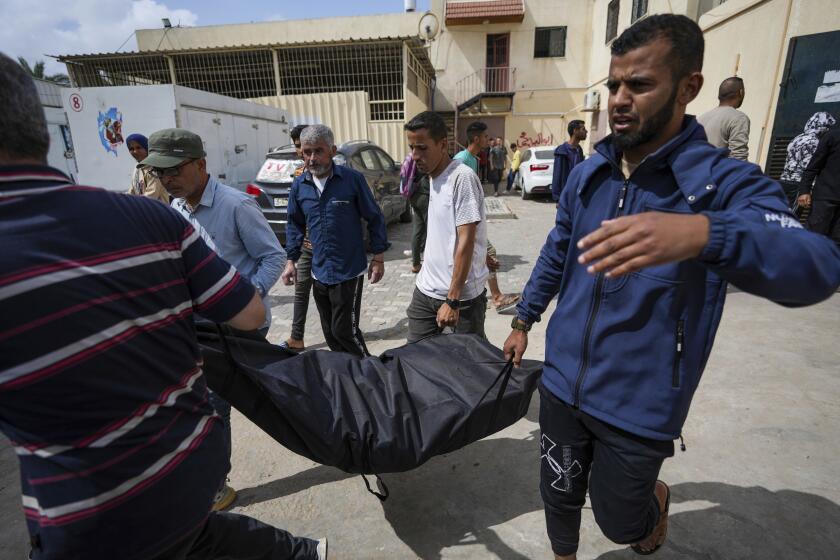Kadafi’s government proposes he stay as a figurehead
As President Obama and Western allies reaffirm their resolve to force Moammar Kadafi from power, the government here is promoting an alternative: The embattled Libyan leader remains as a figurehead who would ensure a transition to democracy.
The idea not only conflicts with the stated goals of the U.S. and its allies, it would seem absurd to rebels who have set up a de facto government in the eastern city of Benghazi and are seeking to end Kadafi’s four decades of violent and erratic rule.
That Kadafi’s aides would float it is in part a sign of how far the strongman’s prospects have fallen since the revolt began in February. The government in Tripoli has lost control of much of the country, and the city faces nightly and increasingly aggressive bombing attacks as it grapples with severe fuel shortages that have angered residents and drained popular support. It is a country under siege.
But the proposal also reflects a strategy that attempts to play on fears of long-term instability and the possibility that if Kadafi cannot be ousted, war-weary Western nations may start looking for a way out of Libya.
The idea seems to be to portray Kadafi as an aging, almost benevolent ruler who is willing to give up real power — but must remain to prevent Iraq-style chaos in the oil-rich nation just across the Mediterranean from Europe.
“If you don’t have Kadafi, you don’t have democracy,” Musa Ibrahim, chief government spokesmen, said Wednesday. “This is official: Kadafi is willing to be part of a constitution that gives him no executive powers whatsoever. He is a figurehead.
“Without Kadafi we will not have democracy: We will have tribal feuds, we will have internal civil war, we will have Al Qaeda,” Ibrahim said. “Kadafi is the safety valve not just for Libya, for the North African region, for Europe, for the States.”
Despite its tribal divisions, Libya does not have the Sunni-Shiite sectarian split or deep ethnic tensions that have contributed to violence in countries such as Iraq, the former Yugoslavia and Somalia. But government officials frequently invoke those comparisons.
The calculation here seems to be that the “figurehead” alternative would mollify demands for reform while allowing Kadafi and his family to remain in Libya, where they could avoid arrest warrants that might be issued in coming weeks by the International Criminal Court.
President Obama and British Prime Minister David Cameron, meeting Wednesday in London, vowed not to relax the fierce NATO bombing campaign being carried out in Libya. Both leaders insisted that Kadafi must go.
“There will not be a letup in the pressure we are applying,” Obama said at a joint news conference. “Ultimately this is going to be a slow, steady process in which we’re able to wear down the regime forces.”
But Kadafi loyalists appear to be pinning their hopes on a weakening of Western resolve. NATO can’t bomb forever, they say privately.
If the North Atlantic Treaty Organization bombs don’t kill Kadafi, and rebel forces stalled hundreds of miles away are unable to march on Tripoli, analysts say, some kind of negotiation is possible as a way out for the alliance, which is facing economic pressures, concerns about “mission creep” and division over issues such as the deployment of attack helicopters.
In addition, Russia and other nations have complained that the United Nations mandate to protect Libyan civilians seems to have morphed into a NATO campaign aimed at killing Kadafi.
“I think now politicians are realizing that … Kadafi is much more resilient than they thought he would be,” said Benoit Gomis, a researcher at the Chatham House think tank in London. “I think they’re finding the solution to the conflict is a political one and not a military one.”
The Benghazi-based rebels and their allies in Europe and North America insist that Kadafi must go before there are any negotiations.
Opposition leaders dismiss the Kadafi government’s offers of a cease-fire and a pullback of forces from all cities under an internationally brokered deal. The regime says it’s even open to a U.S.-led “fact-finding mission” to investigate allegations that civilians were murdered.
But the rebels are ultimately dependent on foreign air power, analysts say, and would have little choice but to accept some kind of talks should Western leaders decide to go that route. It was European and U.S. air power that saved Benghazi from being overrun in March.
Officials in Tripoli, including Khaled Kaim, the deputy foreign minister, have told journalists that even before the uprising, the government was against the idea of one of Kadafi’s sons succeeding him, even though Western diplomats and others widely assumed that his sons were vying for the post. In a request last week for judges to issue arrest warrants, International Criminal Court prosecutor Luis Moreno-Ocampo described Kadafi’s son Seif Islam as the de facto prime minister.
The succession comments appear to be part of a strategy to separate Kadafi and his family from the question of Libya’s future, while ensuring that Libya’s longtime leader is not forced from the country and put on trial.
Kadafi himself has suggested that he is mostly a ceremonial leader. After the protests erupted this winter, he compared himself to Britain’s Queen Elizabeth II. His only title is the Leader, and his aides and tribal allies have said that he can’t resign because he has no official position.
But George Joffe, a research fellow and Libya expert at Cambridge University, said Kadafi would never accept a backseat. “He either runs things, or he has to be removed,” Joffe said.
Times staff writer Henry Chu in London contributed to this report.
More to Read
Start your day right
Sign up for Essential California for news, features and recommendations from the L.A. Times and beyond in your inbox six days a week.
You may occasionally receive promotional content from the Los Angeles Times.






